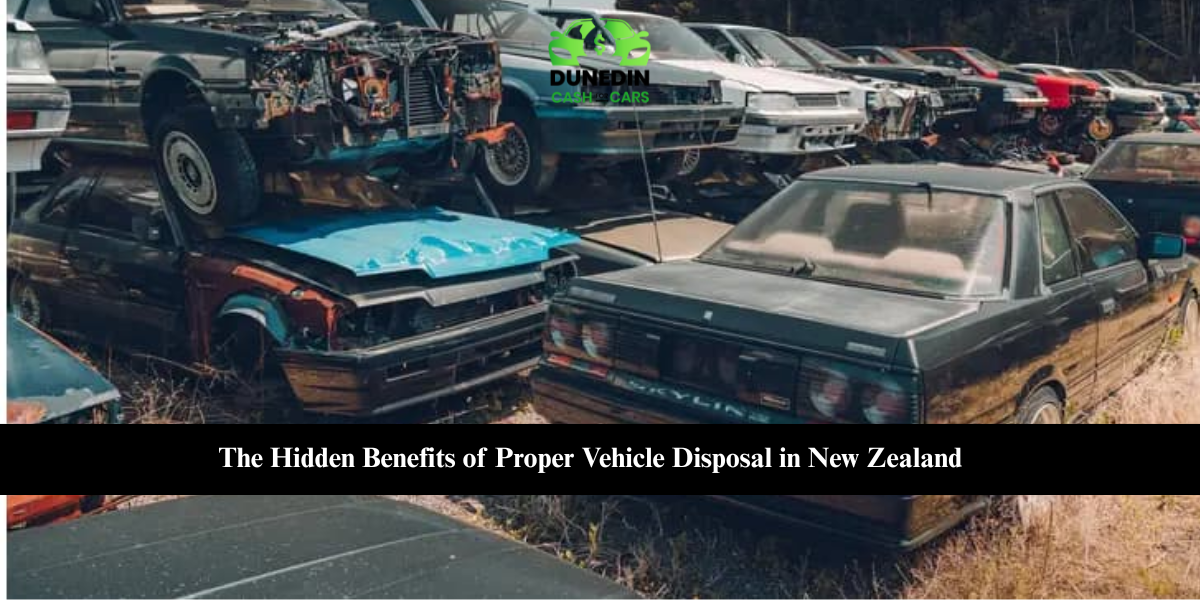Disposing of your car might seem like just another task to tick off. But behind that simple transaction lies something bigger—environmental wins, financial returns, and legal protections that most Kiwis overlook. Understanding proper vehicle disposal means knowing you’re doing more than clearing space in your driveway. You’re protecting yourself legally, contributing to resource conservation, and often walking away with cash you didn’t expect.
Why Legal Compliance Matters More Than You Think
Proper vehicle disposal requires cancelling your registration with the NZ Transport Agency to avoid ongoing liability for the vehicle.
Without cancelling registration through an MR15 form at authorised agents, you remain legally responsible. That means fines for expired licenses, unpaid Road User Charges, and potential liability if someone illegally uses your old vehicle. Surrendering number plates and completing the paperwork closes the loop entirely. Skipping this step has cost vehicle owners hundreds in fees they never saw coming.
What Happens to Your Vehicle After Collection?
Licensed wreckers dismantle vehicles systematically—draining fluids first, then removing sellable parts, before crushing the shell for scrap metal recovery.
The sequence protects New Zealand’s environment:
- Engine oil, brake fluid, and coolant are extracted and processed separately
- Batteries and catalytic converters are removed due to their valuable metals
- Working components like alternators and transmissions are tested and resold
- Remaining metal is crushed and sold to steel recyclers
- Hazardous materials are handled according to Resource Management Act requirements
This process prevents toxic chemicals from entering our soil and waterways. One vehicle contains enough oil and coolant to contaminate thousands of litres of groundwater if improperly dumped.
How Much Is Your Old Vehicle Actually Worth?
Scrap values in New Zealand range from $300 to $9,999 depending on weight, condition, and current metal market rates.
Your payout reflects several factors:
- Vehicle weight: Larger utes and SUVs contain more recyclable steel
- Functional parts: Working engines or gearboxes add significant value
- Market timing: Scrap metal prices fluctuate with global demand
- Accessibility: Easy collection locations sometimes yield better offers
Japanese imports typically fetch competitive prices due to quality components that remain in demand. European vehicles may offer higher returns for specific parts even when mechanically failed.
What Are the Real Environmental Gains?
Recycling end-of-life vehicles prevents approximately 1.5 tonnes of raw materials per car from needing extraction and processing.
The environmental maths adds up quickly:
- Steel production from recycled material uses 60% less energy than virgin steel
- Every tonne of recycled steel saves 1,400 kilograms of iron ore
- Proper fluid disposal prevents contamination of New Zealand’s freshwater systems
- Rubber and plastics can be repurposed rather than sitting in landfills
- Aluminium recovery requires 95% less energy than producing new aluminium
New Zealand processes thousands of end-of-life vehicles annually. Each one properly recycled means less pressure on mining operations and lower carbon emissions from manufacturing.
Why Free Collection Saves You More Than Towing Costs
Professional wreckers offering free collection eliminate transport expenses that would otherwise run $150 to $400 depending on distance and vehicle condition.
Beyond the obvious savings:
- No need to find a tow truck or arrange transport yourself
- Saves time that would be spent coordinating logistics
- Removes risk of breakdowns during final journey
- Eliminates need for a WOF or registration for towing
- Prevents potential roadside hazards from non-roadworthy vehicles
Collection services across Dunedin and surrounding areas mean you avoid the hassle entirely. The wrecker assumes all transport responsibility and associated costs.
Does Vehicle Age Impact Disposal Benefits?
Older vehicles often contain more recoverable steel but fewer sellable parts, while newer damaged vehicles may have valuable components despite being write-offs.
Age considerations include:
- Pre-2000 vehicles typically contain simpler mechanical parts still in demand
- 2000-2010 models balance parts value with scrap weight
- Newer vehicles offer electronic components and sensors worth recovering
- Classic or collectible vehicles may have niche parts market value
- Complete vehicles always fetch more than partially stripped ones
Insurance write-offs from recent accidents can surprise owners with their residual value. Even heavily damaged newer vehicles contain electronics, airbag systems, and body panels worth recovering.
What Documents Make the Process Faster?
Title documents proving ownership and photo identification are the minimum requirements, with registration papers speeding up the cancellation process.
Having these ready accelerates everything:
- Original vehicle title showing your name
- Driver’s licence or other government-issued ID
- Most recent registration renewal documentation
- Service history if available (helps value assessment)
- Keys and remote fobs if still functional
Missing a title isn’t necessarily a deal-breaker. Reputable wreckers can guide you through obtaining duplicate titles, though this adds time to the transaction.
How Does Proper Disposal Protect Groundwater?
A single vehicle contains up to 20 litres of fluids that can contaminate water supplies if not professionally extracted and processed.
The contamination risk is real:
- Engine oil spreads thin films across water surfaces, blocking oxygen
- Coolant contains ethylene glycol that poisons wildlife and enters drinking water
- Brake fluid’s petroleum base damages aquatic ecosystems
- Transmission fluid takes years to break down naturally
- Battery acid corrodes soil and leaches into groundwater tables
Licensed dismantlers have containment systems and processing agreements with hazardous waste handlers. Your vehicle’s fluids get properly treated rather than seeping into the environment.
Can You Remove Parts Before Disposal?
You can remove aftermarket accessories and personal modifications before disposal, but removing core components typically reduces the vehicle’s overall value.
Smart removals versus poor choices:
- Good to remove: Custom stereos, GPS units, aftermarket wheels
- Consider carefully: Performance exhausts, body kits, upgraded suspension
- Avoid removing: Engines, transmissions, catalytic converters, airbags
Wreckers value complete vehicles higher because they save dismantling time. Removing major components might earn you $200 selling them privately but cost you $500 in reduced wrecker offers.
What Makes Dunedin’s Disposal Market Different?
Dunedin’s smaller market means quicker collection times and more personalised service compared to Auckland or Wellington’s larger, more corporate operations.
Local advantages include:
- Same-day or next-day collection availability
- Direct communication with the people handling your vehicle
- Better understanding of regional access challenges
- Strong reputation-based business relationships
- Straightforward processes without corporate bureaucracy
Regional wreckers depend on local reputation. They can’t afford the negative reviews that might get lost in larger markets, which often translates to better customer treatment.
How Do Storage Costs Add Up When Delaying Disposal?
Non-operational vehicles cost New Zealand property owners an average of $300 yearly in lost rental potential or property value impacts.
Hidden costs of keeping that dead car:
- Registration and licensing fees if you forget to cancel
- Insurance if you don’t properly notify your provider
- Depreciation as the vehicle deteriorates further
- Potential council compliance notices for eyesore properties
- Lost opportunity cost of space that could serve other purposes
The vehicle sitting in your driveway for “someday” loses value monthly. Acting sooner rather than later typically puts more money in your pocket.
Turn That Old Car Into Something Valuable
New Zealand’s vehicle disposal system works when you work with the right people. Proper disposal means cash in hand, legal protection, and environmental responsibility handled in one straightforward transaction.
Looking to dispose of your unwanted vehicle across Dunedin and surrounding areas? Dunedin Cash for Cars specialises in hassle-free removal with instant cash offers, free towing, and full paperwork handling. Their team makes the entire process simple—quote, collection, payment—usually completed within 24 hours. No hidden fees, no runaround, just straightforward service that respects your time.
Get your free quote at Dunedin Cash for Cars and discover what your old vehicle is really worth.

